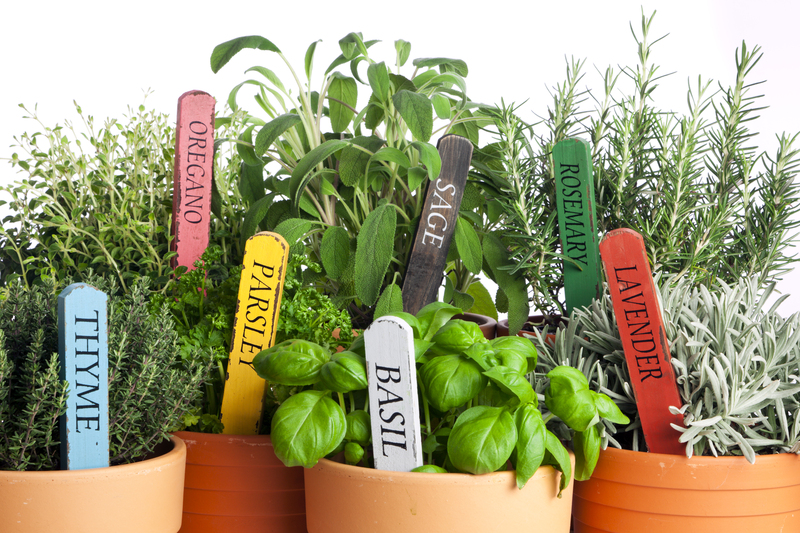Breathe New Life: Starting Steps for Your Garden Makeover
Posted on 28/05/2025
Breathe New Life: Starting Steps for Your Garden Makeover
Is your outdoor space looking tired and uninspired? Do you dream of vibrant blooms, lush greenery, and a cozy sanctuary in your backyard? If so, it's time to breathe new life into your garden. Transforming your landscape might seem overwhelming, but with the right steps and thoughtful choices, your garden makeover can be both rewarding and enjoyable. In this comprehensive guide, we'll explore essential first steps, creative ideas, and practical tips to help you kickstart your garden transformation. Whether you're an absolute beginner or a seasoned gardener, our advice will set you up for success.
Why Consider a Garden Makeover?
A garden makeover isn't just about aesthetics; it can boost your home's value, improve well-being, and provide an oasis to unwind.
- Increased Property Value: A beautiful garden can attract potential buyers and make a lasting impression.
- Personal Sanctuary: Your backyard can become a peaceful retreat to escape everyday stress.
- Environmental Benefits: Adding native plants, composting, and water-saving features support local wildlife and sustainability.
- Family Bonding: A revamped garden fosters outdoor activities, gardening projects with kids, and social gatherings.

Step 1: Assessing Your Current Garden
Before diving in, take a closer look at your existing garden. Understanding what you have will inform your plans and help you avoid costly mistakes down the road.
- Survey Your Space: Walk around and make notes of sunlight patterns, areas with heavy shade, and spots that stay soggy or dry out quickly.
- Inventory Existing Plants: Identify which plants are thriving and which ones need replacing.
- Analyze Soil Quality: Soil testing kits are widely available and simple to use. Healthy soil is the foundation of a vibrant garden makeover.
- Document Problems: Look for pest infestations, diseases, or overgrowth that needs attention.
- Take Photos: Capture images before starting to track your garden's progress over time.
Tip: Keep a dedicated garden journal to document your findings and jot down future plans.
Step 2: Define Your Garden Makeover Goals
Every outdoor transformation project needs a clear vision. Consider what you want to achieve with your garden revamp. Ask yourself:
- Do I want a low-maintenance landscape or a cottage-style oasis?
- Am I aiming to attract wildlife, such as bees and butterflies?
- Should there be dedicated areas for entertaining, relaxing, or play?
- Will I grow edibles (herbs, fruits, vegetables) alongside ornamentals?
By pinpointing your goals, you'll streamline the makeover process and avoid getting sidetracked by trends that don't suit your lifestyle.
Garden Styles to Inspire Your Makeover:
- Modern Minimalist: Clean lines, geometric shapes, and structured plantings.
- Wildlife-Friendly: Pollinator plants, birdhouses, and water features for nature-lovers.
- Edible Gardens: Raised beds for herbs, veggies, and fruits.
- Cottage Charm: Abundant blooms, winding paths, and a romantic vibe.
- Zen Retreat: Water elements, bamboo, and calming stone arrangements.
Step 3: Planning a Functional Layout
Every garden makeover needs a cohesive plan. Start sketching ideas--use paper and pencil or free online tools tailored for landscape design. Remember, your outdoor space should balance aesthetics with utility.
- Zoning Your Space: Separate your garden into functional zones (seating, play, dining, planting).
- Pathways and Flow: Add paths to move easily around your garden and guide visitors through points of interest.
- Hardscaping: Decide where you'll add paving, decking, pergolas, or raised beds as part of your garden transformation.
- Privacy & Screening: Consider fences, hedges, or trellises for secluded areas.
- Utilities: Plan locations for lighting, irrigation, and outdoor power sources.
Pro Tip: Think about year-round use--consider where sunlight falls during different seasons and plan for all-weather enjoyment.
Step 4: Choose Plants Wisely for Lasting Impact
The heart of any garden refresh is the right plant selection. You'll want to build a planting scheme that offers beauty, biodiversity, and practicality.
- Go Native: Choose plants that thrive in your local climate for a resilient, eco-friendly garden.
- Layer Plant Heights: Create drama and interest by mixing groundcovers, shrubs, small trees, and tall perennials.
- Seasonal Interest: Plan for a garden that looks great year-round, not just in one season.
- Color and Texture: Blend foliage shapes, flower colors, and contrasting leaf textures for eye-catching displays.
- Edibles: Herbs, fruit bushes, and vegetables add beauty and utility to your outdoor transformation.
Tip: Invest in quality soil amendments and mulch before planting. Healthy soil is the backbone of a successful garden remake.
Step 5: Rejuvenate Soil and Manage Weeds
Great gardens start from the ground up. Revitalize your soil to ensure lush plant growth:
- Remove Weeds: Pull out weeds by hand or use appropriate weed barriers
- Aerate Compacted Soil: Use a garden fork or aerator to loosen the ground for better root growth.
- Enrich with Compost: Mix in compost or organic matter for fertility and improved structure.
- Test and Amend pH: Adjust acidic or alkaline soils as needed for your chosen plants.
Tip: Organic mulch helps retain moisture, suppress weeds, and feed your soil as it decomposes.
Step 6: Incorporating Beautiful Hardscape Features
Hardscaping can define your garden makeover. Think patios, decorative paths, garden walls, or even a water feature. These elements add structure, functionality, and visual interest to your outdoor space.
- Patios & Decks: Extend your living space for lounging, dining, or entertaining outside.
- Pathways: Use gravel, stone, or pavers to connect various areas in your garden.
- Raised Beds: Make gardening more accessible and control soil quality in planting zones.
- Water Features: Ponds, fountains, or birdbaths bring tranquility and invite wildlife.
- Garden Art: Statues, trellises, and colorful pots provide personality and focal points.
Pro Tip: Balance hard surfaces with plenty of soft planting to avoid a sterile look.
Step 7: Set Up a Low-Maintenance Garden
If you want your garden transformation to last, consider features that minimize upkeep:
- Drought-Tolerant Plants: These require less watering and thrive on neglect.
- Mulching: Reduces weeds and keeps soil moist, saving you time and effort.
- Automatic Irrigation: Drip systems or soaker hoses keep plants hydrated efficiently.
- Simple Lawn Areas: Smaller grass areas are easier to mow and maintain.
- Plant in Groups: Grouping similar plants simplifies watering and care.
Clever Design for Effortless Gardening
Utilize groundcovers, weed barriers, and slow-release fertilizers. These easy habits extend the life and beauty of your garden remake while freeing up your weekends for enjoyment, not chores.
Step 8: Personalize and Accessorize Your New Garden
Now comes the fun part--adding personal touches that make your garden uniquely yours.
- Outdoor Furniture: Choose comfy, weather-resistant seating for relaxation and gatherings.
- Lighting: Solar lights, lanterns, or string lights create ambience for evening enjoyment.
- Planters & Pots: Brighten patios and pathways with colorful container gardens.
- Wildlife Accessories: Bird feeders, insect hotels, or butterfly puddling dishes add life and interest.
- Decor: Mirrors, wall art, wind chimes, and DIY crafts reflect your personality.
Integrating these details marks the final stage of your transformation and encourages you to spend more time outdoors.
Step 9: Create a Sustainable Garden for the Future
As you plan your garden makeover, prioritize sustainable, eco-friendly choices wherever possible:
- Choose Native Species: Reduce water, fertilizer, and maintenance needs.
- Compost: Recycle kitchen scraps and garden waste into nutritious mulch.
- Harvest Rainwater: Install barrels to collect rain for watering during dry spells.
- Avoid Chemicals: Opt for organic fertilizers and natural pest solutions.
- Let Wild Areas Thrive: Designate a corner for wildflowers or a small wildlife meadow.
Tip: A sustainable approach looks after your garden and the planet, creating a space that's beautiful for years to come.

Maintenance: Keep Your Refreshed Garden Thriving
After your initial garden makeover, regular care ensures it flourishes long-term:
- Watering: Adjust based on weather, plant needs, and established systems.
- Pruning: Trim plants to encourage healthy growth and prevent overgrowth.
- Feeding: Apply fertilizer or compost at key times in the season.
- Weeding: Stay on top of weeds to prevent them from taking over new beds and borders.
- Monitor for Pests: Catch problems early to minimize damage.
Set reminders in your garden journal for maintenance checkpoints. Healthy habits ensure your new outdoor space remains a joy for years to come.
Conclusion: Your Garden Makeover Journey Begins
Breathe new life into your outdoor haven by following these essential starting steps for a successful garden makeover. By assessing your space, defining goals, designing functional layouts, selecting the right plants, revitalizing your soil, and incorporating sustainable practices, you'll create a garden that adds value, beauty, and sustainability to your home. Make your transformation a journey, not a chore--enjoy each step, celebrate your progress, and share your oasis with friends and family.
Are you ready to start your garden makeover? Gather your ideas, grab your tools, and let nature inspire you!
Latest Posts
Creative strategies for handling wind in your garden
From Scraps to Riches: Revitalizing Soil with Organic Waste
Top Techniques to Control Weeds in Your Garden



